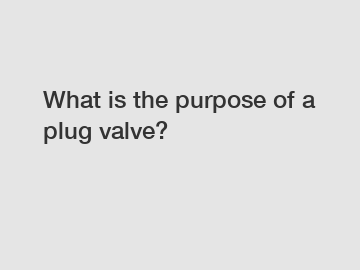What is the purpose of a plug valve?
What is the Purpose of a Plug Valve?
Plug valves are widely used in various industries for controlling the flow of liquid or gas in a pipeline. They consist of a cylindrical or conical plug that can be rotated within the valve body to open or close the passage for fluid flow. The plug has a hole in it, aligned with the inlet and outlet ports when open, and perpendicular to the ports when closed. With their simple yet effective design, plug valves offer numerous benefits and serve specific purposes in different applications.
Primary Heading: The Basics of Plug Valves.

The primary purpose of a plug valve is to control the flow of fluid through a pipeline. By rotating the plug within the valve body, the flow can be shut off completely or allowed to pass freely. When the plug aligns with the inlet and outlet ports, the valve is in an open position, allowing fluid to flow through. Conversely, when the plug is turned to a 90-degree angle, it blocks the passage, closing the valve and stopping the flow. This straightforward operation makes plug valves suitable for both on/off and throttling applications.
Secondary Heading 1: Tight Shut-Off and Low Pressure Drop.
One of the significant advantages of plug valves is the tight shut-off they provide. When the valve is fully closed, the plug forms a seal against the valve body, preventing any leakage of the fluid. This tight shut-off capability makes plug valves ideal for applications where precise control is required, such as those involving hazardous or volatile substances. Additionally, plug valves offer low pressure drop during operation, ensuring minimal resistance to the flow and allowing efficient use of energy.
Secondary Heading 2: Simple Maintenance and Durability.
Plug valves are known for their simple design, which contributes to ease of maintenance. With fewer components, these valves can be disassembled quickly for cleaning, inspection, and repairs. The cylindrical or conical plug can be easily removed, eliminating the need for specialized tools or complicated procedures. Moreover, plug valves are typically constructed from durable materials such as stainless steel or high-grade alloys, enabling them to withstand harsh operating conditions and maintain optimal performance over an extended period.
Secondary Heading 3: Versatility and Adaptability.
Plug valves offer versatility and adaptability, making them suitable for a wide range of applications across different industries. They can handle various fluids, including liquids, gases, and slurries, making them useful in water treatment plants, chemical processing industries, oil and gas refineries, and more. Plug valves can also withstand high temperatures and pressures when properly designed, allowing for their use in demanding environments. Additionally, their compact size makes them an excellent choice for installations with limited space.
Secondary Heading 4: Types of Plug Valves.
There are different types of plug valves available, each designed for specific applications. Some common types include lubricated plug valves, non-lubricated plug valves, and sleeved plug valves. Lubricated plug valves are equipped with a sealant injection system that helps reduce friction and wear, making them suitable for high-pressure applications. Non-lubricated plug valves, on the other hand, are preferred for applications involving corrosive fluids, as they eliminate the need for lubrication that could contaminate the fluid. Sleeved plug valves have a rubber or elastomeric sleeve around the plug, providing excellent sealing even in abrasive conditions.
Closing Paragraph: If you require assistance with plug valves or need more information about their applications, feel free to contact us. Our team of experts is here to help you with your valve selection and provide any necessary guidance to ensure optimal performance in your specific industry or application.
In conclusion, plug valves serve the purpose of controlling fluid flow in a pipeline efficiently. With their tight shut-off, low pressure drop, durability, and versatility, plug valves are invaluable in various industrial sectors. By understanding their features and different types, you can select the most suitable plug valve for your specific needs. For more queries or information, do not hesitate to reach out to us. Contact us today to find the perfect plug valve solution for your requirements.
For more information, please visit fracturing wellhead, choke manifold drilling, api 16c choke manifold.
247
0
0

Comments
All Comments (0)